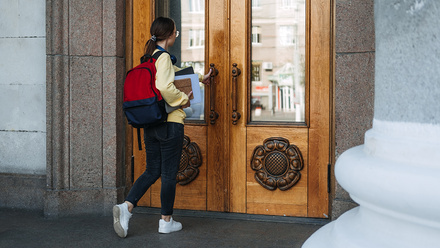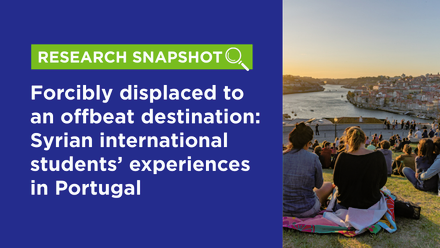Harnessing the power of heritage languages

Inclusivity and social sustainability goals are vital to the work of internationalisation in higher education today. There are a variety of innovative ways to focus on meeting these targets, including leveraging the valuable linguistic and intercultural resources of our students with a heritage language. Heritage languages are the languages that families speak at home that do not correspond to the local language(s). These languages are also sometimes referred to as home, family or community languages. How can we, as higher education institutions and professionals, benefit and learn from students with heritage languages?
What do students with a heritage language bring to the table?
Heritage language speakers — referred to in short here as ‘heritage speakers’ — are often raised in two or more cultures and develop trans and intercultural skills as they navigate daily between the communities to which they belong. This ‘native’ or ‘natural’ interculturality is acquired through contact with the different cultures that heritage speakers live with. For example, knowing about Christmas even though Şeker Bayram is celebrated at home, or being able to recognise that the term ‘family’ in the home language can have broader dimensions (including more distant relatives, for example) than in the language of instruction (where it might imply only the nuclear family).
Adopting and adapting linguistic and cultural concepts and values on a daily basis since childhood turns heritage speakers into people with valuable, wide-ranging intercultural skills and insights.
Growing up in two or more cultures that have diverse concepts of ‘honour’, or different connotations of ‘sun’ and ‘shadow’, turns the resulting adults into native bicultural bilinguals. Adopting and adapting linguistic and cultural concepts and values on a daily basis since childhood turns heritage speakers into people with valuable, wide-ranging intercultural skills and insights. But is this potential also being perceived in international higher education?
The possible role of heritage languages in IHE
Once grown up, many heritage speakers study successfully at universities but without their special additional skills — their respective heritage languages(s) and the attendant cultural skills — being perceived by others. These overseen additional competences and skills are not being adequately recognised. With exception of some widely spoken languages (such as English, Spanish, German and other prestigious languages which traditionally can be formally studied as a subject and are therefore valued with ECTS) heritage speakers have no space to thrive with their specific plurilingualism, as their heritage language is not part of the curriculum. Encompassing a more inclusive multilingual approach in higher education is surely a sensible step towards realising linguistic and cultural equality and, consequently, sustainable development. At a time when sustainability and the SDGs are on everyone's lips, the lack of attention to and support for plurilingualism and the wealth of skills and insights it affords, is a true waste of resources.
Let us think of the vast number of languages we collectively encounter in our work in international higher education every day, and which could be the heritage language of our students (Ukrainian, Turkish, Hindi, to just name a few). It is both fascinating and necessary to explore how the involvement of heritage speakers could help to raise mutual understanding in a globalised world, which is a key objective of the internationalisation of higher education.
Added value from existing language skills: good practice at the University of Regensburg
A good example of how heritage speakers have been specifically promoted for more than a decade can be found at the University of Regensburg. The so called 'secondos programme' (a term deriving from the 2nd migrant generation in Switzerland - a collective term originally used in Switzerland describing the children of foreign parents who grew up in, and were often born in, the destination country, and who received all or most of their schooling in the destination country) is designed for students who have grown up in Germany but have a second language and cultural background. The programme is open to all subjects and follows a simple concept: Students spend their first year at their home university, the second year at a partner university abroad where their heritage language is spoken, and the third year back at their alma mater. The students of the programme attend the same seminars and lectures as their fellow students. However, they must also attend several supplementary courses — including cultural studies and intensive language lessons. Many students have spoken their heritage language with their parents at home, but have no experience in reading and writing in that language (or not at the level required for studies at HE), so good preparation is decisive for the success of the stay abroad. During their stay at the partner university abroad, they are naturally integrated in the local curriculum and attend modules together with local students.
By going through this experience, students get to know their parents’ country from a new perspective. Suddenly, this country that was previously understood and labelled as simply their ‘home country’ is transformed into a country with new facets. The change of perspective experienced through this kind of academic mobility promotes an awareness of the student’s own trans- and interculturality and ultimately leads to a strengthening of their identity as a bicultural being. As a global citizen, being able to move interculturally at home and on the international stage is an important and useful skill.
Seizing the opportunity of heritage languages
In Europe, we have the opportunity to further develop existing practices in various languages and promote the value of language skills through targeted, customised measures. This does not have to be a full programme such as the one at the University of Regensburg, but can start with independent semesters, individual modules, or summer schools as first steps to valorise the existing skills of students. Bern University of Applied Sciences, for example, has started to offer individual interdepartmental elective modules (BFH diagonal) such as ‘Language Skills for the Professional World’, ‘Guaraná com Chocolate - Brazilian Swiss exchange (COIL)’ and ‘I speak bilingual: Learning German/French with and from each other’, to name a few. A common goal of these modules is to deepen the knowledge of existing skills by recognising, acknowledging, validating and supporting the students to empower themselves during the learning process. Applying and developing these skills for professional purposes in the target language, via role play, real life experiences, excursions, and working in groups, are just some activities to foster pre-existing skills and competences linked to heritage languages.
It is high time we seized the opportunity by working together to promote heritage languages through curriculum design in (international) higher education. It is a wonderful opportunity to look at internationalisation through another lens by unveiling and recognising existing multilingualism and multiculturalism in your own institution. By unlocking these resources, one can foster internationalisation of the curriculum with simple, purposive measures. And last but not least, there is the opportunity to gain new agile and innovative forms of international student mobility which offer the participating partner institutions new opportunities to raise their profile and simultaneously have a high impact on society and foster sustainability by contributing to more equal, diversity-oriented inclusive education.






